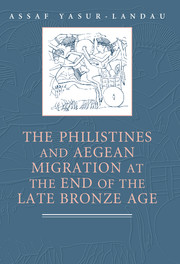Book contents
- Frontmatter
- Contents
- Acknowledgments
- INTRODUCTION
- 1 THE ARCHAEOLOGICAL IDENTIFICATION OF MIGRATION AND OTHER RANGES OF INTERREGIONAL INTERACTIONS
- 2 SETTING THE SCENE: THE MYCENAEAN PALATIAL CULTURE AND THE OUTSIDE WORLD
- 3 THE TWELFTH-CENTURY-BCE AEGEAN: POLITICAL AND SOCIAL BACKGROUND
- 4 PRECONDITIONS FOR MIGRATION
- 5 ALONG THE ROUTES
- 6 STRICTLY BUSINESS? THE SOUTHERN LEVANT AND THE AEGEAN IN THE THIRTEENTH TO THE EARLY TWELFTH CENTURY BCE
- 7 THE MATERIAL CULTURE CHANGE IN TWELFTH-CENTURY PHILISTIA
- 8 THE PHILISTINE SOCIETY AND THE SETTLEMENT PROCESS
- 9 A SHORT HISTORY OF THE AEGEAN IMMIGRATION TO THE LEVANT
- Bibliography
- Index
1 - THE ARCHAEOLOGICAL IDENTIFICATION OF MIGRATION AND OTHER RANGES OF INTERREGIONAL INTERACTIONS
Published online by Cambridge University Press: 04 August 2010
- Frontmatter
- Contents
- Acknowledgments
- INTRODUCTION
- 1 THE ARCHAEOLOGICAL IDENTIFICATION OF MIGRATION AND OTHER RANGES OF INTERREGIONAL INTERACTIONS
- 2 SETTING THE SCENE: THE MYCENAEAN PALATIAL CULTURE AND THE OUTSIDE WORLD
- 3 THE TWELFTH-CENTURY-BCE AEGEAN: POLITICAL AND SOCIAL BACKGROUND
- 4 PRECONDITIONS FOR MIGRATION
- 5 ALONG THE ROUTES
- 6 STRICTLY BUSINESS? THE SOUTHERN LEVANT AND THE AEGEAN IN THE THIRTEENTH TO THE EARLY TWELFTH CENTURY BCE
- 7 THE MATERIAL CULTURE CHANGE IN TWELFTH-CENTURY PHILISTIA
- 8 THE PHILISTINE SOCIETY AND THE SETTLEMENT PROCESS
- 9 A SHORT HISTORY OF THE AEGEAN IMMIGRATION TO THE LEVANT
- Bibliography
- Index
Summary
Those who settle on foreign shores will either found their own independent settlement, or infiltrate among the local population; and they will either bring their own wives, or marry indigenous women in their new homes. Between these two pairs of alternatives there can, of course, be many intermediate situations.
– Coldstream, “Mixed Marriages at the Frontiers of the Early Greek World,” 1993ESTABLISHING THE COURSE OF INQUIRY
The great methodological advances in the archaeological identification of ancient migration conducted in the 1990s (e.g., Burmeister 2000; Anthony 1990; 1997; 2000) were achieved by implementing insights gathered from anthropological and historical case studies. The use of explicit and sound methodology to study migration effectively ended the dislike that, in the 1980s, many “new” archaeologists felt for migrationist explanations, which many archaeologists had used until then as magical, catchall explanations for material cultural change.
The theoretical advances in the study of migration have greatly benefited, and still do, from studies of historical archaeology (e.g., Cheek 1998; Deetz 1996; Diehl, Waters, and Thiel 1998). Such studies are an excellent source of specific insights and theoretical approaches for any research dealing with migration. Because this field was practically born in the New World, much of it deals with different aspects of migration and settlement in the Americas and elsewhere. It is therefore traditionally theoretically sensitive to questions of colonial interaction and migration, and it is usually supplemented by much better literary sources than are any of the cases of ancient colonization.
- Type
- Chapter
- Information
- Publisher: Cambridge University PressPrint publication year: 2010



